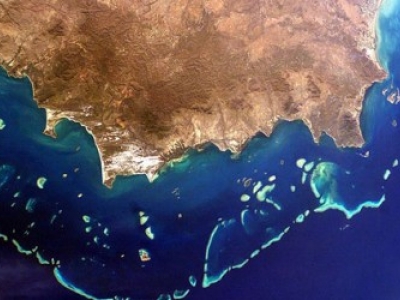ATSB report systemic found safety issues re pilot training & fatigue management
(Photo: Queenland coast/ Great Barrier Reef – satellite photo)
Systemic safety issues in Queensland coastal pilotage operations have been identified in an Australian Transport Safety Bureau (ATSB) investigation report.
Coastal pilots form a key defence against a serious shipping incident in parts of the Great Barrier Reef and Torres Strait as part of a suite of broader protective measures already in place.

(Photo credit: ATSB)
The ATSB began an investigation into coastal pilotage operations in December 2010 following the release of its report into the grounding of the piloted tanker Atlantic Blue in the Torres Strait and a request from the Australian Maritime Safety Authority (AMSA)-the coastal pilotage safety regulator. That report identified safety issues affecting coastal pilotage which indicated that other systemic issues may also exist that would benefit from the ATSB further investigating.
The ATSB’s safety issue investigation found that under the coastal pilotage regulations, no organisation, including the pilotage provider companies, has been made clearly responsible and held accountable for managing the safety risks associated with pilotage operations. This has meant that responsibility for managing the most safety critical aspects of pilotage has rested with individual pilot contractors instead of an organisation that systematically manages safety risk.
The investigation also identified systemic safety issues surrounding pilot training, fatigue management, incident reporting, competency assessment and use of coastal vessel traffic services.
AMSA has already taken and proposed safety action to address the issues identified and is working with pilots, pilotage providers and industry to make further improvements to shipping safety in the region. Significant AMSA action includes the publishing of standard passage plans for pilotage, and requiring pilotage providers to develop standard operating procedures for pilotage tasks undertaken by their contractor pilots. On 1 July 2012, AMSA also began a review of its coastal pilotage regulations.
The ATSB welcomes AMSA’s response but considers further action is necessary to fully address the safety issues. In particular, the ATSB is recommending that AMSA ensures that the coastal pilotage regulations specifically assign responsibility for the safe management of pilotage operations to the pilotage providers or another organisation.
The ATSB has also issued recommendations to the three coastal pilotage providers to take safety action in relation to fatigue management and incident reporting to facilitate action by AMSA.
Following the allowed 90-day period after the issue of its recommendations, the ATSB will reassess the safety risk based on the action taken and proposed by AMSA, and the pilotage providers to address the issues.
Read theQueensland Coastal Pilotage (MI-2010-011) report.
Source: ATSB

































































